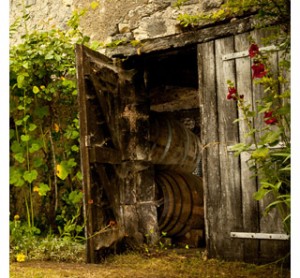The Effect of the Cellar on Ageing Cognac
 We place much emphasis on the ageing of cognacs as it is critically important that they gain the maximum maturity whilst in their oak casks. We have spoken before about the barrel size, shape and type of oak but the actual cellar chosen for storage is also vitally important. The conditions of storage can make, or break, a fine cognac.
We place much emphasis on the ageing of cognacs as it is critically important that they gain the maximum maturity whilst in their oak casks. We have spoken before about the barrel size, shape and type of oak but the actual cellar chosen for storage is also vitally important. The conditions of storage can make, or break, a fine cognac.
French cellars used to house cognac are typically quite small, perhaps only housing a couple of hundred barrels. Most are also old and damp, often old stores or farm buildings, perhaps old chapels or buildings that would normally be thought unsuitable for storing such valuable spirits. Many do not even have a proper floor, just the earth, perhaps where animals have been kept during cold winter months, but it is these old buildings that provide the finest conditions for cognac ageing.
Good barrel ageing extracts the useful substances from the oak barrels. Tannins form around 5% of these substances but others, including lignin and hemi-cellulose, are also useful. As these substances gradually dissolve in the maturing spirit, they impart the agreeable sweetness found in some older cognacs. It is therefore very important that cognac spends as much time as possible in contact with these useful elements found in the wood.
There is of course a limit as to how long these substances last in the relatively neutral oak barrels so it is important to ensure that the barrels are stored in the finest conditions. The humidity of the old stores in the Charente ensures that the barrels are largely damp on the outside. This prevents the smaller spirit molecules from escaping and retains them in the oak for a longer period.
An agreeable climate in the Charente provides more suitable ambient storage in these old stores than in purpose made warehouses on other shores. ‘Early landed’ cognacs are brandies which are stored in bonded warehouses abroad and have customs documents proving when they were made. The provision of this additional storage may be an advantage but both the length of time the cognacs are stored and the conditions in bond may fall some way short of ideal. Only by constant, expert monitoring can it be established when a cognac is ready for bottling and indeed if the storage conditions have allowed the cognac to gain the full benefit from the barrel.
We hear of all sorts of ideas for brandy storage but whatever is happening on the outside of the barrel, there are only two factors which affect ageing inside: temperature and humidity. It is the reaction of the old oak barrel and the cognac that will provide us with the finest cognacs. It therefore seems strange to me that some brandy houses want to age their cognacs in unusual places. A rather well-known Norwegian house has chosen to age a barrel of their 40 year old cognac in a fort in the mouth of the Charentes for a few months “to see how maritime weather affects the finished product”. If the barrels are stored correctly and tightly sealed with a cork which is waxed over to prevent the ingress of air, what difference will the maritime weather make?
